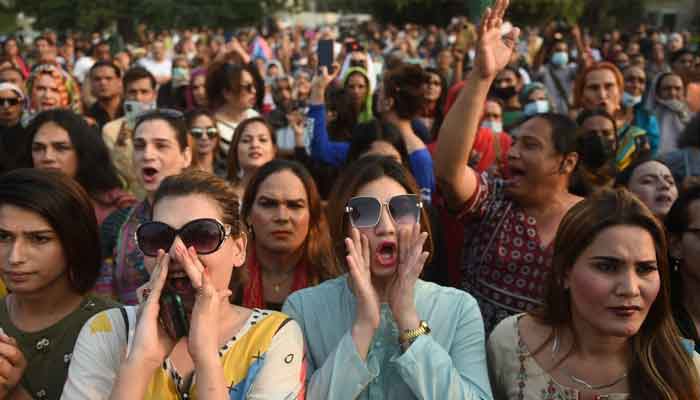Amnesty International terms FSC ruling ‘blow’ to transgender rights
Amnesty International says revocation of rights of transgender and gender-diverse people must be stopped
Amnesty International on Saturday termed the Federal Shariat Court's (FSC) ruling a "blow to the rights of the already beleaguered group of transgender and gender-diverse" people in Pakistan.
On Friday, the FSC ruled that it was not for the transgenders to decide their gender, and they were not allowed to change their gender based only on their self-proclaimed feelings and desires, in a major verdict striking down sections of the Transgender Persons (Protection of Rights) Act, 2018.
"The revocation of rights of transgender and gender-diverse people must be stopped," the international human rights watchdog said in response to the verdict.
A statement issued by the organisation quoted their research assistant, Rehab Mahamoor as saying that "the verdict is a blow to the rights of the already beleaguered group of transgender and gender-diverse people in Pakistan".
She said that some of the observations made by the court were based on presumptive scenarios rather than empirical evidence.
"The denial of essential rights of transgender and gender diverse persons should not be guided by assumptions rooted in prejudice, fear and discrimination.
"Any steps taken by the government to deny transgender and gender-diverse people the right to gender identity were in contravention of their obligations under international human rights law, namely the International Covenant on Civil and Political Rights (ICCPR) and the Convention on the Elimination of All Forms of Discrimination against Women (CEDAW) to which they are a state party," she stated.
The AI official urged the government to take immediate and urgent steps to stop the reversal of essential protections, saying that the denial of these rights would leave the community at a greater risk of harassment, discrimination and violence.
FSC verdict
The FSC ruled that sections 2(f), 3 and 7 of the Transgender Act 2018 which relate to gender identity, the right to self-perceived gender identity and the right of inheritance for transgender people do not conform with their interpretation of Islamic principles.
The order was announced by the Acting Chief Justice of the Federal Shariat Court Dr Syed Muhammad Anwer and Justice Khadim Hussain Shaikh on a petition challenging the Transgender Act, which has been widely considered a positive step in the advancement of transgender rights.
The court made it clear in its order that gender was related to a person's biological sex, and that it has a specific bearing on how various forms of worship, including daily prayers, fasting, Hajj, etc are performed in Islam.
“A person's gender cannot be determined by their feelings,” said the ruling and added: "Shariah does not permit anyone to have their gender reassigned because of impotence as the gender remains the same as it was at birth".
“No one can be declared transgender based on physical features and self-made identity,” said the verdict and added that the gender of an individual would be determined by their dominant physical features or secondary sex characters.
The court stated that those exhibiting dominant male features would be considered male transgenders and those having dominant female secondary sex characters would be deemed female transgenders.
The court, however, ruled that it was the responsibility of the government to ensure the rights of transgender persons as "Islam provides them will all human rights".
“If a man or a woman calls themselves transgender outside of their biological sex then it is against Shariah,” said the verdict.
The verdict stated that Section 7 and Section 3 of the Transgender Protection Act were against Islam and Shariah. The court also struck down Section 2F of the Transgender Act.
The court also declared that the rules made under the Transgender Protection Act as “illegal”.
-
Security forces gun down 30 terrorists in multiple IBOs in KP: ISPR
-
MQM-P calls for new province in Sindh
-
US report validates Pakistan military edge over India: PM
-
Banned TTP poses serious threat to Pakistan security: UNSC panel
-
CM Afridi clarifies remarks on by-poll after ECP requests army deployment
-
Dubai sees 3.2m Pakistani passengers in 2025 as airport sets new milestone
-
Security forces kill 23 Indian proxy terrorists in KP's Kurram
-
Pakistan to construct island to boost oil exploration: report












